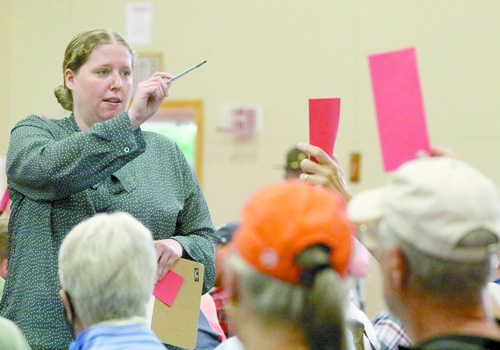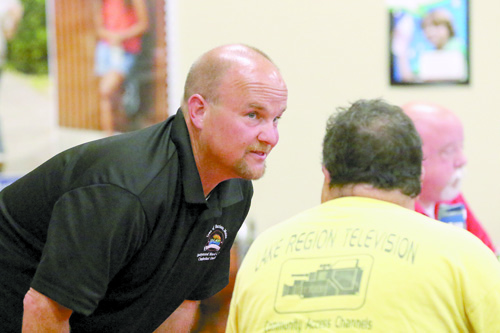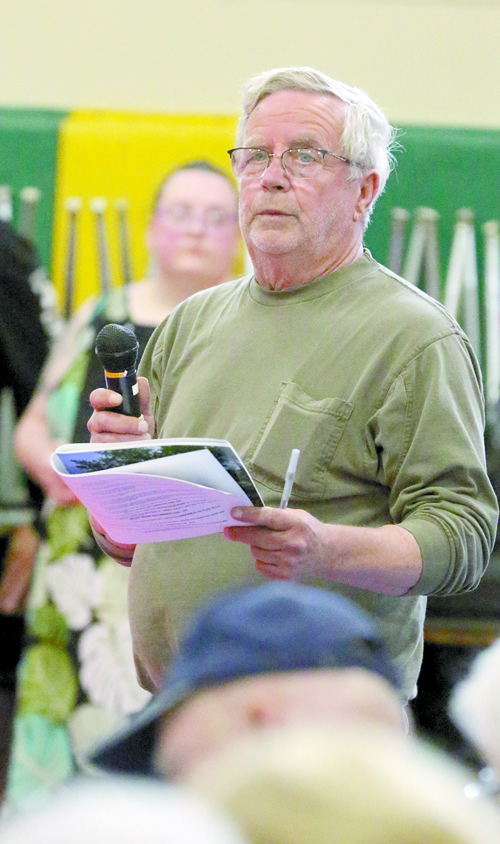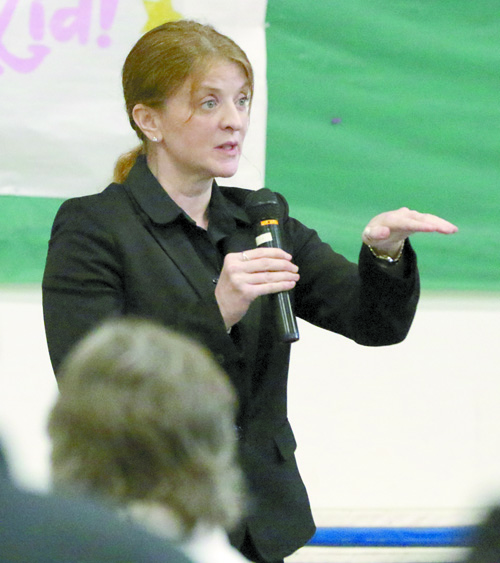Harrison voters reject staff additions; encourage Select Board to seek fire department assessment study

By Wayne E. Rivet
Staff Writer
HARRISON — As moderator Vern Maxfield welcomed citizens to Harrison’s in-person annual town meeting, he declared “it is a privilege to be here tonight.”
“It’s a real blessing we still have town meeting,” he added. “We’re here to do business. Let’s respect one another.”
Unfortunately, the meeting was a bit rocky.
Maxfield’s microphone chirped throughout the evening, creating noisy feedback that proved distracting and irritating, to some. Others sitting in the back bleacher section struggled to hear explanations from officials using the testy microphone.
There were plenty of questions regarding proposed budget line increases and staff additions, while conversation teetered between being civil and confrontational.
As expected, the two hot button items were how to address fire coverage and whether to add a Public Works assistant director position as the town takes on several infrastructure improvement projects, including construction of a new Public Works garage.

Public Works Director Andy Ward came under fire regarding a proposal to purchase an excavator and trailer at a $365,000 price tag. While money would be taken from the Capital & Reserve Fund, some residents questioned why Ward didn’t look into a lease/purchase and others wondered why costs had skyrocketed from an estimate of $200,000 a year ago to $365,000. Ward had looked at four different models, and found the proposed number was “the best price.”
The measure passed 89-46.
Next was whether the town should hire an Assistant Public Works director to take a few responsibilities off Ward’s plate. Newell noted that Ward oversees four departments — Parks, Rec, Transfer Station and Public Works — as well as working with contractors building the new PW garage complex.
By hiring an “assistant,” Newell said that individual could take on tasks if Ward is unavailable.
The expected cost — salary ($70-$75,000) and benefits — would be $99,275.
Residents countered that if more hands are needed to keep pace with a growing to-do list, the town might be better served by adding a base employee or two, especially at the proposed rate. Newell clarified that the average pay rate is $25 per hour, totaling $52,000 per year, not including benefits.
Citizen John Strickland noted that “a number of things going on will come to an end,” thus questioning the need for an assistant.
The article failed.

The highly-anticipated debate regarding what direction citizens want to head in for firefighting provided the most heated drama of the night.
The idea of hiring a full-time fire chief failed a year ago, so this time around, town officials proposed a couple of alternatives.
Article 19 raised $184,988, basically maintaining existing services. Voters approved this article.
Article 20 called for “additional” fire department staffing — either a full-time chief at $74,000 (base salary of $60,000 plus benefits) or 7 days per week, 6 a.m. to 6 p.m. coverage for $210,000 (this could be two EMS/firefighters or one along with a chief). For a full-time chief and 7 days per week coverage would cost $284,000.
Outgoing Select Board chairman Rick Sykes pointed out officials made “no recommendation” feeling it was up to the townspeople to decide.
Citizen Tracy Estes questioned why no assessment study had been done after last year’s failed vote on hiring a fire chief.
“Where was the money coming from?” Fire Chief Dana Laplante asked. “No, we didn’t do it.”
Laplante said the proposals are all about “your protection, your safety.”
“We’re asking you to help us out. We don’t have the people to do it (firefighting) as it is supposed to be done,” the chief said. “We’re hurting, worse than ever before.”
Article 20 failed with voters encouraging the Select Board to seek a “free” fire department assessment.
The News reached out to a local fire chief regarding a department assessment study, and was told the only state agency he was aware of to take on this task would be the Maine Fire Service Institute — the lead agency for firefighting training and certification in Maine. The chief was confident that such a study carries a cost.

“In 2006, they did an assessment of our needs regarding a ladder truck. They evaluated what we had at that time and what we needed based on our buildings, hazards, development etc. At that time, the study cost the town I believe $2,000,” the chief added.
Several private companies also do fire department assessments for a fee, based upon an agreed scope of assessment.
In other business:
• Newell clarified several matters, including why firefighters were serving as traffic flaggers during sidewalk construction and why the Rec budget was up.
First, the company doing sidewalk work had a number of workers call out sick and reached out for help to be able to continue building. “It was a 1-time deal,” said Newell, adding the town will be reimbursed for the cost.
As for the rec increase, Newell pointed out the town was finally returning to a full summer rec and swim program. To do so, the state requires a certain ratio between children and counselors, as well as providing lifeguards (one or two). Based on a kid count of 120 (Harrison and Waterford), the town would need to hire 12 to 15 counselors. As of town meeting, 10 have been hired, Newell said.
At a recent Select Board meeting, Newell asked members to waive an existing nepotism clause so that a “very qualified” candidate could be hired as part of the summer rec staff. While Newell was unable to identify how the applicant is related to a town employee, she was able to say the candidate’s supervision would fall under a non-family member. The Select Board approved the one-time request.
Several questions were posed regarding what the town paid for various services a year ago (such as Cumberland County Sheriff’s Office deputies) compared to what officials were asking for in this budget. In many cases, those answers could be found in a well-done town report, which included line item breakdowns. The report was available to the public three weeks ago.
In eight minutes, voters zipped through seven articles including raising $250,000 for the Comprehensive Capital Reserve Account. Voters approved Mooring Ordinance amendments, but rejected changes to the Building Permit Ordinance.
The final “no” vote came when citizens were asked whether they wanted to conduct business via a secret ballot or continue with open floor meetings.
One citizen said he often voted “no” when using the secret ballot method if he didn’t understand the question or have the necessary information to make an informed decision. He found in-person town meetings as “transparent” and an effective way to gain information before making a decision.
A “yes” called for a secret ballot approach.
A “no” meant keeping the in-person meeting. “No” was the clear winner.

